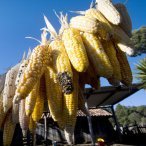English · Español

17 de octubre de 2013 | Noticias | Anti-neoliberalismo | Soberanía Alimentaria
As in many parts of the world
New Cases of GM Contamination in Uruguay
Descargar: MP3 (1.9 MB)
The National Network of Native and Creole Seeds of Uruguay denounced the contamination of creole corn in Quebrada de los Cuervos, Treinta y Tres department, before the Commission for Risk Management (CGR) and the members of the National Biosafety Board (GNBio).
In a letter sent on October 11, the Network of Native Seeds also asked for measures to secure the farmers’ right to decide on the production of non genetically modified (GM) crops, in this case corn. They also sent a list of corn producers interested in keeping their production GM-free.
The letter urged the authorities to take the necessary measures to prevent the contamination of corn with GM varieties owned by transnational corporations Monsanto, Syngenta, Dow-Pionner and Bayer.
Yesterday, on the World Food Sovereignty Day, REDES –Friends of the Earth Uruguay warned in a press release about new cases of GM contamination in the country, after the cases reported in 2009. The organization expressed great concern over this fact.
Every October 16th peasant and social organizations from all over the world celebrate the World Food Sovereignty Day. This political demand, raised for the first time by La Via Campesina (a global network of peasant organizations) in 1996, reclaims the peoples’ right to choose what food they produce and how, as well as how to commercialize it, considering the cultural and productive situation of each country and region.
GRANECO is an Uruguayan cooperative that has developed a GM-free grain production project with the support of Unidad de Montevideo Rural of the Municipality of Montevideo and the General Office of Rural Development of the Ministry of Livestock, Agriculture and Fisheries (MGAP). At the cooperative’s request, researchers of the School of Chemistry of the University of the Republic analysed samples of creole corn seeds to be used in the project.
This was possible through an agreement between REDES-FoE Uruguay and the School of Chemistry. They found contamination of creole corn seeds in the samples taken from Quebrada de los Cuervos, in Treinta y Tres department. The contaminated samples contained the protein Cry1Ab, produced by GM BT corn.
A research conducted in October of 2009 by the Schools of Agronomy, Chemistry and Sciences of the same University at the request of REDES-FoE confirmed GM contamination in GM-free corn in the country. At the time, three of the five cases studied with samples of different corn fields in Uruguay were contaminated.
The National Network of Native and Creole Seeds is made up by 160 family farmers, which include over 250 producers from different departments. The network was created in 2004 at the initiative of the Uruguayan Association of Organic Farmers (APODU) and REDES-FoE Uruguay, with the participation of the School of Agronomy through the Centro Regional Sur. In 2006, the MGAP declared the initiative of Ministerial interest.
Uruguay has signed international agreements that force the country to protect its genetic resources. The rescue and conservation of phytogenetic resources and the need to have creole seeds are the network’s main motivation. In August, the network made an open call to producers of non GM corn to express their interest in keeping the GM-free aspect of their corn. As a result of this call, a list was created with over 50 interested producers.
Presidential Decree 353/008, governed by the regulation on GM crops provides that the State should practice a “regulated coexistence”, which means to set up mechanisms that will secure the farmers’ right to produce GM and GM-free crops. Five years later, there is no resolution by the competent authority that sets up such a measure. What is more, resolutions 276/2003 and 292/2004of the Ministry of Housing, Land-Use Planning and Environment , which provided a minimum 250-meter distance between GM and GM-free corn plantations for GM corn varieties MON 810 (Monsanto) and BT11(Syngenta) were repealed by the GNBio last year.
In its press release, REDES –FoE called on the authorities to take the necessary measures to prevent the contamination of Uruguayan creole corn.
Imagen: http://oaxacalibre.org








